 Operation and Maintenance
Operation and Maintenance
 Linux Operation and Maintenance
Linux Operation and Maintenance
 How to mount a separately created cloud disk (used as a data disk) to an ECS instance
How to mount a separately created cloud disk (used as a data disk) to an ECS instance
How to mount a separately created cloud disk (used as a data disk) to an ECS instance
This article introduces how to mount a separately created cloud disk (used as a data disk) to an ECS instance, focusing on the specific operation steps.
Mount cloud disk
You can mount a separately created cloud disk (used as a data disk) to an ECS instance. You can choose to mount the cloud disk from the instance management page or mount the cloud disk from the cloud disk management page.
Notes
Before mounting the cloud disk, you need to understand the following precautions:
Created with the instance The cloud disk does not need to be mounted.
You can only mount cloud disks used as data disks, and there is no need to mount cloud disks used as system disks.
When mounting a cloud disk, the instance must meet the following conditions:
The instance status must be Running or Stopped, and cannot be Locked.
Instances are not in arrears.
When mounting a cloud disk, the status of the cloud disk must be Available.
Cloud disks can only be mounted to instances in the same availability zone in the same region and cannot be mounted across availability zones.
One ECS instance can mount up to 16 cloud disks for data disk use. At the same time, one cloud disk can only be mounted on one instance.
Independently created cloud disks can be mounted to any instance in the same availability zone in the same region (including prepaid and pay-as-you-go instances).
Prerequisite
You have created ECS instances and cloud disks in the same availability zone. For detailed operations, see Step 2 of Creating a Cloud Disk and Personal Edition Quick Start: Create an ECS Instance.
Mount cloud disks on the instance management page
#To mount multiple cloud disks on an ECS instance, go to the instance management page The page operation is more convenient. Follow the steps below to mount the cloud disk on the selected instance:
Log in to the ECS management console.
In the left navigation bar, click Instances.
Select a region.
Find the instance to which the cloud disk needs to be mounted and click the instance ID.
In the left navigation bar, click the instance disk, and click Mount Cloud Disk in the upper right corner of the disk list.

In the pop-up dialog box, complete the following settings:
Target disk: Only cloud disks in the same availability zone with a status of "pending to be mounted" can be selected.
The disk is released with the instance: If selected, when the instance is released, the cloud disk will also be released at the same time.
Automatic snapshots are released with the disk: If selected, when the cloud disk is released, all automatic snapshots created by the cloud disk will be released together, but manual snapshots will not be released. It is recommended that you do not select this option and keep the backup data.
After completing the settings, click OK and click to execute the mount.
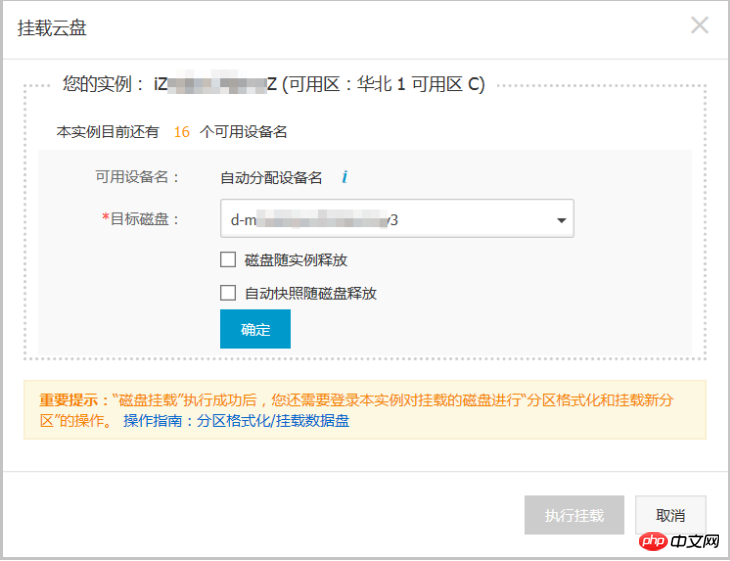
Refresh the disk list of this instance.
If the status of the cloud disk changes to In use, it means the mounting is successful.
Depending on the contents of the cloud disk and the operating system of the ECS instance, you must perform different operations to make the cloud disk available. As shown in the table below.
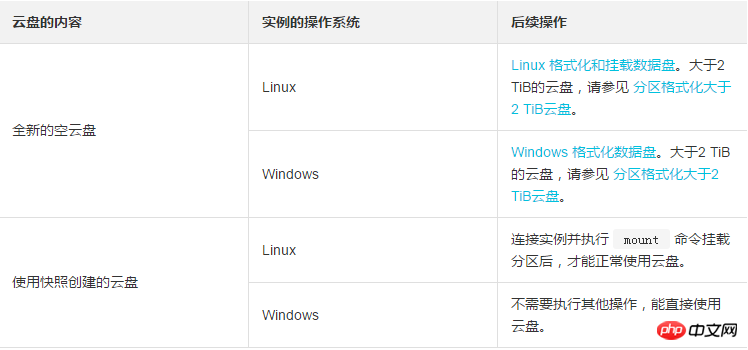
Mount the cloud disk on the cloud disk management page
If you want to mount multiple cloud disks To download to different ECS instances, it is more convenient to operate on the cloud disk management page. Follow the steps below to mount the selected cloud disk to the instance:
Log in to the ECS management console.
In the left navigation bar, select Storage > Cloud Disk.
Select a region.
Find the cloud disk to be mounted, and in the Operation column, select More > Mount.
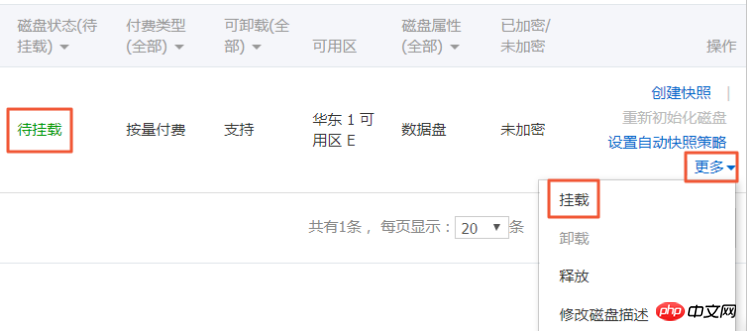
In the pop-up dialog box, complete the following settings:
Target instance: Only ECS instances in the same availability zone can be selected.
The disk is released with the instance: If selected, when the instance is released, the cloud disk will also be released at the same time.
Automatic snapshots are released with the disk: If selected, when the cloud disk is released, all automatic snapshots created by the cloud disk will be released together, but manual snapshots will not be released. It is recommended that you do not select this option and keep the backup data.
After completing the settings, click to execute the mount.
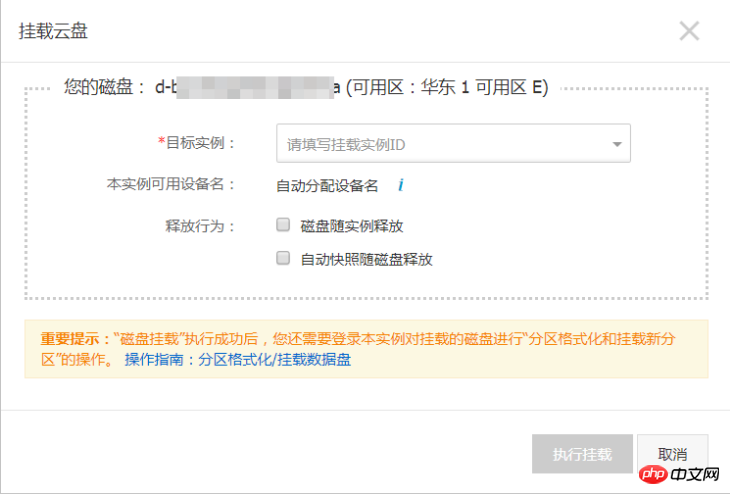
Refresh the cloud disk list.
If the status of the cloud disk changes to In use, it means the mounting is successful.
Depending on the contents of the cloud disk and the operating system of the ECS instance, you must perform different operations to make the cloud disk available. As shown in the table below.
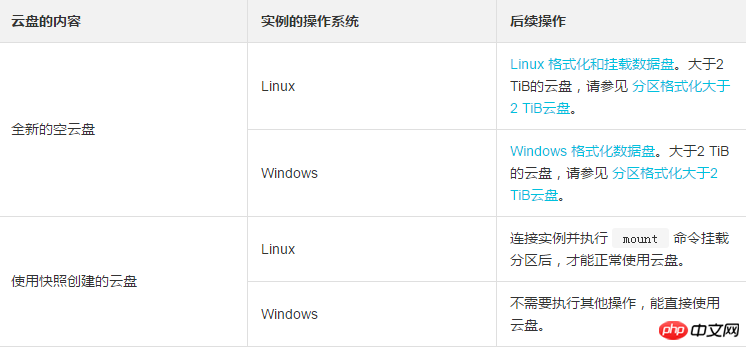
Follow-up operations
After using the cloud disk for a period of time, according to business needs, you can perform the following Different operations:
You can restore the cloud disk to its initial state by reinitializing the cloud disk.
If you need a larger capacity cloud disk, you can expand it. For specific operations, see Expanding Data Disk_Linux or Expanding Data Disk_Windows.
You can back up cloud disk data by creating a snapshot. Alternatively, set an automatic snapshot policy for the disk and create automatic snapshots.
If you need to restore the cloud disk to its state at a certain moment, you can use a snapshot to roll back the cloud disk.
If your instance no longer requires a cloud disk, you can unmount the cloud disk and release the cloud disk to avoid unnecessary costs.
Related API
AttachDisk
The above is the detailed content of How to mount a separately created cloud disk (used as a data disk) to an ECS instance. For more information, please follow other related articles on the PHP Chinese website!

Hot AI Tools

Undresser.AI Undress
AI-powered app for creating realistic nude photos

AI Clothes Remover
Online AI tool for removing clothes from photos.

Undress AI Tool
Undress images for free

Clothoff.io
AI clothes remover

AI Hentai Generator
Generate AI Hentai for free.

Hot Article

Hot Tools

Notepad++7.3.1
Easy-to-use and free code editor

SublimeText3 Chinese version
Chinese version, very easy to use

Zend Studio 13.0.1
Powerful PHP integrated development environment

Dreamweaver CS6
Visual web development tools

SublimeText3 Mac version
God-level code editing software (SublimeText3)

Hot Topics
 deepseek web version entrance deepseek official website entrance
Feb 19, 2025 pm 04:54 PM
deepseek web version entrance deepseek official website entrance
Feb 19, 2025 pm 04:54 PM
DeepSeek is a powerful intelligent search and analysis tool that provides two access methods: web version and official website. The web version is convenient and efficient, and can be used without installation; the official website provides comprehensive product information, download resources and support services. Whether individuals or corporate users, they can easily obtain and analyze massive data through DeepSeek to improve work efficiency, assist decision-making and promote innovation.
 How to install deepseek
Feb 19, 2025 pm 05:48 PM
How to install deepseek
Feb 19, 2025 pm 05:48 PM
There are many ways to install DeepSeek, including: compile from source (for experienced developers) using precompiled packages (for Windows users) using Docker containers (for most convenient, no need to worry about compatibility) No matter which method you choose, Please read the official documents carefully and prepare them fully to avoid unnecessary trouble.
 BITGet official website installation (2025 beginner's guide)
Feb 21, 2025 pm 08:42 PM
BITGet official website installation (2025 beginner's guide)
Feb 21, 2025 pm 08:42 PM
BITGet is a cryptocurrency exchange that provides a variety of trading services including spot trading, contract trading and derivatives. Founded in 2018, the exchange is headquartered in Singapore and is committed to providing users with a safe and reliable trading platform. BITGet offers a variety of trading pairs, including BTC/USDT, ETH/USDT and XRP/USDT. Additionally, the exchange has a reputation for security and liquidity and offers a variety of features such as premium order types, leveraged trading and 24/7 customer support.
 Ouyi okx installation package is directly included
Feb 21, 2025 pm 08:00 PM
Ouyi okx installation package is directly included
Feb 21, 2025 pm 08:00 PM
Ouyi OKX, the world's leading digital asset exchange, has now launched an official installation package to provide a safe and convenient trading experience. The OKX installation package of Ouyi does not need to be accessed through a browser. It can directly install independent applications on the device, creating a stable and efficient trading platform for users. The installation process is simple and easy to understand. Users only need to download the latest version of the installation package and follow the prompts to complete the installation step by step.
 Get the gate.io installation package for free
Feb 21, 2025 pm 08:21 PM
Get the gate.io installation package for free
Feb 21, 2025 pm 08:21 PM
Gate.io is a popular cryptocurrency exchange that users can use by downloading its installation package and installing it on their devices. The steps to obtain the installation package are as follows: Visit the official website of Gate.io, click "Download", select the corresponding operating system (Windows, Mac or Linux), and download the installation package to your computer. It is recommended to temporarily disable antivirus software or firewall during installation to ensure smooth installation. After completion, the user needs to create a Gate.io account to start using it.
 Ouyi Exchange Download Official Portal
Feb 21, 2025 pm 07:51 PM
Ouyi Exchange Download Official Portal
Feb 21, 2025 pm 07:51 PM
Ouyi, also known as OKX, is a world-leading cryptocurrency trading platform. The article provides a download portal for Ouyi's official installation package, which facilitates users to install Ouyi client on different devices. This installation package supports Windows, Mac, Android and iOS systems. Users can choose the corresponding version to download according to their device type. After the installation is completed, users can register or log in to the Ouyi account, start trading cryptocurrencies and enjoy other services provided by the platform.
 gate.io official website registration installation package link
Feb 21, 2025 pm 08:15 PM
gate.io official website registration installation package link
Feb 21, 2025 pm 08:15 PM
Gate.io is a highly acclaimed cryptocurrency trading platform known for its extensive token selection, low transaction fees and a user-friendly interface. With its advanced security features and excellent customer service, Gate.io provides traders with a reliable and convenient cryptocurrency trading environment. If you want to join Gate.io, please click the link provided to download the official registration installation package to start your cryptocurrency trading journey.
 How to Install phpMyAdmin with Nginx on Ubuntu?
Feb 07, 2025 am 11:12 AM
How to Install phpMyAdmin with Nginx on Ubuntu?
Feb 07, 2025 am 11:12 AM
This tutorial guides you through installing and configuring Nginx and phpMyAdmin on an Ubuntu system, potentially alongside an existing Apache server. We'll cover setting up Nginx, resolving potential port conflicts with Apache, installing MariaDB (





